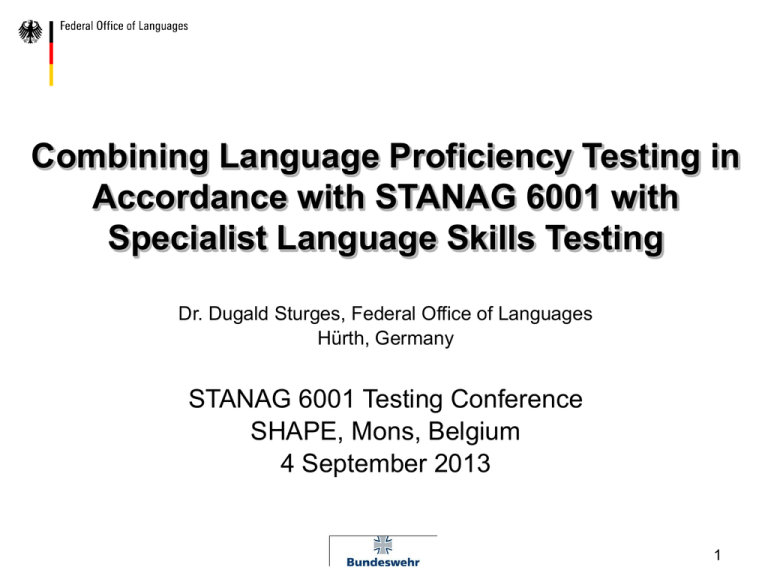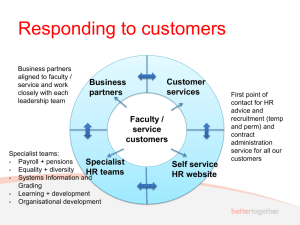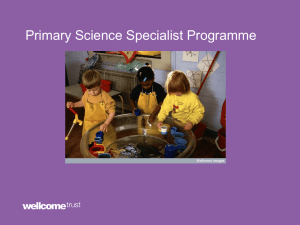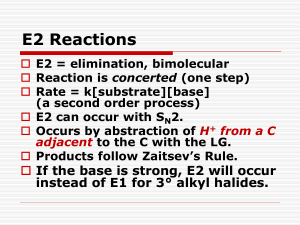Combining Proficiency Testing IAW STANAG 6001, Ed 4 with
advertisement

Combining Language Proficiency Testing in Accordance with STANAG 6001 with Specialist Language Skills Testing Dr. Dugald Sturges, Federal Office of Languages Hürth, Germany STANAG 6001 Testing Conference SHAPE, Mons, Belgium 4 September 2013 1 Combining Language Proficiency Testing with Specialist Language Skills Testing T ES T I N G SLP P Goal of testing i.a.w. STANAG 6001: • To determine language proficiency • …defined as “An individual’s unrehearsed, general language communication ability.” Goal of testing i.a.w. STANAG 6001: The table of language proficiency levels on which the SLP is based is intended to: • a. Communicate language requirements for international staff appointments. • b. Record and report, in international correspondence, measures of language proficiency. • c. Compare national standards through a standardized table while preserving each nation’s right to maintain its own internal proficiency standards. The implication: • An SLP does not qualify you to do anything. Content Language Acquisition vs General Language Acquisition ESP aims at conveying: • a) abilities required for successful communication in occupational settings; • b) content language acquisition dominates s. Dudley Evans and St. John: Developments in ESP: A multi-disciplinary approach. Cambridge: CUP, 1998. • ESP may be restricted as to the language skills to be learned (e.g. reading only - mechanics) • It also may be restricted in terms of standardized lexis (e.g. air traffic controllers) • General language competency is often incongruous to occupational experience. Special language requirements Certain professional tasks require specialist language certification • International requirements: e.g. Aviation (ICAO certification) • National requirements: e.g. Technical-logistic English Pre-Deployment courses (mentors, observers) Medical personnel Etc. The reaction of some stakeholders: • “If an SLP does not qualify you to do anything, but specialist language certification is required, why bother with an SLP?” • Result: Specialists are often not sent for (mandatory) SLP testing before specialist training and testing. 8 • Can SLP testing replace all professional language skills certification? • Is testing according to STANAG proficiency levels always necessary? • Does testing according to STANAG proficiency levels make sense as a means of maintaining and improving quality of specialist performance? • Proficiency Testing vs • Qualification Testing Proficiency vs. Qualification • SLP is an EVALUATION – • You cannot “FAIL” an SLP: “You are what you is.” • Qualification oriented testing verifies the mastery of certain skills needed to perform a particular task • If you do not have these skills you FAIL to be qualified for the task Analogy: Driving Licence vs. Vehicle Certification In order to be certified to operate a particular military vehicle, you first need a valid driver’s license: Example of general driving proficiency (source: USAREUR driver‘s license exam) • “What does this sign indicate?” This is a basic certification. It qualifies you to operate most cars. Analogy: Driving Licence vs. Vehicle Certification However, prior to this certification, you need to have your aptitude for driving evaluated: e.g. Have your vision evaluated: SLPSLPSLP SLPSLPSLP SLPSLPSLP SLPSLPSLP This is a basic aptitude. Without it you cannot be certified. Specialist tasks require specialized certification – and testing 19. When you ford the HMMWV, the vehicle speed should be - a. 20 MPH or less. b. 15 MPH or less. c. 10 MPH or less. d. 5 MPH or less. (Circle choice.) “But if you gotta Ford, why you wanna Humvee?” Military Driver – or Military Vehicle Operator? • Both require basic prerequisite aptitudes and basic driving proficiency, but one also requires additional specialized skills certification. The same holds true for language learning and testing: • Standardized Language Profile SLP • Specialized Language Profile • ESP does not work without SLP. But why not? What makes specialist language “special?” •Specialist language aims at functional tasks, but may require the conveyance of abstract concepts, specialist terminology or use of more advanced structural devices as appropriate to the user’s professional field. • The task may be within the SLP Level 2 range, but the language required to perform that task may be more sophisticated. • Language proficiency is not a value unto itself, but is inextricably embedded in the performance of a particular professional task. 17 ESP testing anchored in a STANAG 6001 framework Example: ICAO certification of Bundeswehr ATC and FIS: • In case of failure of either or both parts of the language examination, all ratings are to be suspended and the examination is to be repeated after 3 months at the latest. During this period the AT officer is to refresh his or her language skills in self study. (…) • “In the case of a repeat failure it is necessary to obtain a new valid 3332 SLP” before the suspension of the rating can be lifted. SLP Level 2… PLUS specialist knowledge? • Examinees with solid language proficiency plus knowledge of specialist terminology and usage are usually prepared for specialist language certification (e.g. ICAO Level 4) • The less specialist knowledge the examinees have, the higher level of language proficiency they need to make up for the deficit. • However, even a Level 4 SLP candidate can not make up for a total lack of specialist knowledge: Language cannot entirely replace practical skills. Consequence : a combination of SLP testing PLUS specialist language qualification is essential. 19 Summary • SLP testing i.a.w. STANAG 6001 is a prerequisite for specialist language training and testing. • Despite considerable agreement between the results of the two types of examination, SLP testing alone cannot entirely replace specialist language certification. • On the same token, specialist language certification alone cannot replace SLP evaluation, as it only tests proficiency in a very specific context. Summary (continued) • SLP testing i.a.w. STANAG 6001 and specialist language testing need to be closely coordinated. • Any combination of SLP and specialist language testing needs to be carefully approached due to the differing testing goals. The reaction of another stakeholder: • “If my commander had sent me to an SLP refresher course beforehand, I would have felt more comfortable taking this qualification exam.” • ‘Nuff said? 22 Thank you for your attention.




